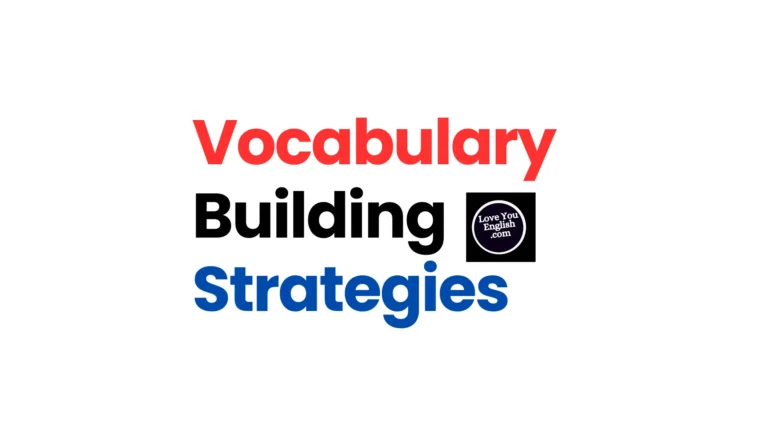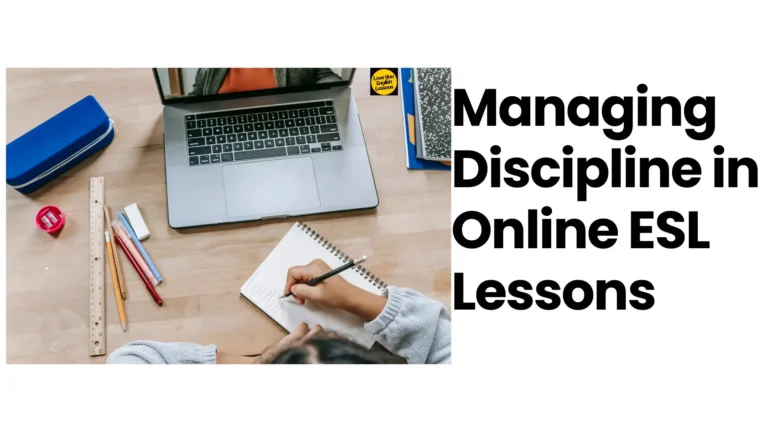Tips for Teaching English in a Classroom
In today’s lesson, I want to answer a few requests that I’ve been receiving. Some people have been asking me if I could offer some tips for teaching in a classroom.
Tips for teaching in a classroom
Now the most common question I get is, “can I make a lesson about tips for teaching a beginner class?”
But this is very specific and so I want to give a more general idea about teaching English, and it doesn’t necessarily alley only to English.
It could alley to many other things. But I’m going to tell you a little bit about my own experiences as an English teacher.
Now what I’m not going to do is teach you, how to teach that you have to learn on your own.
You can go to teachers’ college. You can get a teaching job and start doing it. Because every teacher is different. Every teacher will have his or her own style.
Also read:
- Tips for Teaching English in a Classroom
- Explore the world of TEFL online teaching
- Creating a Positive Learning Environment in ESL classrooms
What I am going to do is share some experiences that help me learn how to be a better teacher, and I think it helped my students as well.
And if it can help you, great, I’m very glad to do that. OK, so I’m going to give you 5 different general tips about.
Teaching what I think is very important for all teachers to know. Now, again, if you’ve been teaching for 30 years, 20 years even, you already know all this stuff.
This is more geared, I guess, aiming towards the younger teachers who are just starting out.
#1
Number one, and this is I think is the most important teachers are students.
If you’re a teacher, you should always be learning.
Just because you’re teaching something doesn’t mean that there’s nothing for you to learn. It’s a two-way street.
You will teach your students, your students will teach you, you will teach yourself.
There’s always something new to learn, now, especially learn your trade. Trade means basically your profession.
So, whether you’re an English teacher or you’re a car mechanic or you’re a scientist, always learn about your business. If you’re an English teacher, first of all, don’t think that you know everything.
About English, I’ve been teaching 10 years and I still have to look grammar points.
I still have to look words in the dictionary. I don’t know everything about English, but I know how to learn.
I know how to teach myself about English when things come up. OK, so always be learning.
If there’s new developments in your industry, new methodologies, new techniques, new tools like on the Internet for example, learn about these, use them. Help your students.
You may want to read:
- Effective Strategies for Teaching English Grammar
- How to Teach English to Beginners
- Using Technology to Improve English Teaching
- Get Started Teaching English Abroad: A Step-By-Step Guide
- Certifications for Teaching English
#2
Next, learn about your students. Learn especially how to read faces.
So, the more you know about your students, the better you can make the classes for them that you, the better you can make the classroom experience.
So, for example, if you find out that most of your students, especially if they’re young, they’re into Instagram.
Make an Instagram lesson. If they’re following sports, introduce sports.
Again, all of these things can be spoken. About in English, all of these topics need vocabulary. They need sentences that require grammar.
Adapt your lessons to your students’ needs, desires, etc. And when I say learn how to read faces, basically understand when a student understands and doesn’t understand when a student is angry or not angry.
But I’m going to talk more about this in part too, because this is very, very important, I think. And this is another very important thing. And at the beginning, every teacher makes the same mistake.
But eventually you learn, it’s OK to make mistakes.
You’re just a teacher. You’re not a robot. You’re not perfect. You don’t know everything. If you make a mistake, that’s fine.
What you should not do is try to talk your way out of a mistake.
If you make a mistake, say sorry I made a mistake. But then fix it right away. Your students will respect you a lot more.
I think from my personal experience, if you make a mistake and then try to cover it by talking and trying to say, oh, it’s not really a mistake, it’s this and that students will eventually just not like you very much.
Again, when I was a beginner teacher, I learned that every teacher I think goes through this experience. And also, don’t be afraid to say I don’t know if a student asks you a question.
And again, English, car mechanic, science, anything. If you don’t know, say I don’t know. Don’t try to make answer just because you’re the teacher. Say you don’t know but.
When you go home at the end of the day, the first thing you should do is find out what the answer to their student’s question is. And then the next time you see the students in the next class, that’s the first thing you should do.
Before you do anything else, answer that student’s question.
It shows them that you care about what they think. It shows them that you’re professional and you take your job seriously. And again, you’re a student too.
Why not learn something new, right? If you don’t know, find out. Teach it.
#3
Next, know your students and I put here just in case.
They are people. Now it seems a little bit obvious, but I think a lot of teachers, one of the things that they don’t take into consideration is that your students have a life outside the classroom.
They have a home. Happy home. Unhappy home. Not. Not sure. Every student is different. They have friends. They have problems with friends. They have caring friends, don’t know.
There are all kinds of things that go on with a student’s life. And unfortunately, or fortunately, it doesn’t really matter. They bring those things with them into the classroom.
They can’t leave them outside in the locker or in their bag or in their phone case. It’s in their heads. You as a teacher have to deal with it. If a student comes into class in a very, very bad mood.
What I personally do, I give that student space. I don’t push. I don’t ask too many questions. If I ask a question and I don’t really get a response, no problem. I don’t get angry. This student has something on his or her mind.
Tomorrow he or she will be OK again today. Leave them alone.
If this continues for a few days, then you start have to ask some questions and find out what’s the problem and if you can help.
But again, remember that every student is bringing something into the class with them so.
It’s very, very important to when I say know your students, it also means get to know their personalities.
Get to know the students
Here, get to know what they like and what’s popular and what everybody’s talking about here.
Get to know individual students. This doesn’t mean that you have to have an interview with each individual student, but over time, over a few classes, you should start to get an idea.
Who’s the shy student, who’s the friendly student? Who’s the student who really doesn’t want to be there? Who’s the student who’s really passionate about?
Whatever it is you’re teaching right, the more you know your students’ personalities, the easier it is to conduct the class and present materials to them.
So, for example, if you have shy students, one of the things I learned was to encourage shy students. Encourage them, try to get them to speak. But know when to step back, don’t push.
Because shy students, if you push too hard, they will just go into a shell and then it’s very difficult to get them out again.
Encourage them and when they need a little bit space, give them space and go to somebody else.
That way they will build their confidence a little bit at a time.
On the other hand, if you have a very friendly student, very confident, very outgoing, say good job and encourage them, but make sure you know how to control them, because if you don’t control them, they will try to speak all the time and nobody else will have a chance.
They will try to take over the class at the end of the day, you the teacher are the boss. Be the boss, but be a friendly boss as much as you can, OK? And give everybody a chance to speak.
Don’t keep going back to one or two students. Even if you know that they’re the only ones who are following you, they’re the only ones who might be able to answer.
Give everybody a chance to speak. And again, just like it’s OK for you to make mistakes, make sure they understand it’s OK for them to make mistakes too.
That’s how you learn. That’s how you build confidence. If you make a mistake, the world is not going to end. You will learn. Next time, you won’t make that mistake.
Now, individual attention.
This is a very tricky thing to do. You don’t want to look like you’re favoring one student over the others.
But if a student has problems, like if one student is just not following, it’s just not getting the material, it’s not getting the grammar and can’t remember the vocab, but most of the other the rest of the class is getting better quickly.
You can’t spend their time helping this student, and you can’t focus too much on this student because he or she will feel bad for the rest of the class.
So, what do you need to do is take the student during the break or after class or before class, find out what the problem is, and maybe give a little bit of extra homework or a little bit of extra attention outside of the class hours.
But again, you must recognize what the problem is with this student and then try to deal with it there. So those are about you and the students.
Let’s look at some other things that I think are important to know. OK. So now I’m going to look a little bit more at the technical side. And now we’re looking more specifically at English.
OK, very important. And I’ve seen so many teachers do this, and I’ve trained many teachers by the way. I’ve trained teacher around India, and I’ve seen all kinds of teachers and I’ve seen all kinds of students.
But one of the things that I never really understood is teachers who only stick to the book.
Don’t, in my opinion, don’t rely too heavily on the textbooks.
Use the textbooks to teach the base of whatever topic it is you want to teach your students, and then put a textbook away and be flexible, right?
You don’t have to do the same thing all the time. You can make adjustments. You be like be open to what your students are saying, be open to what other teachers might be suggesting, try different things, experiment. The textbooks are not enough.
They’re good for foundation, the base. What you need is actually real English, and that’s what you want to introduce into your class. And this is why I also say variety is the spice of life.
If students understand that every day they’re going to come into the classroom and they’re going to just follow the book straight, straight, straight.
Well, they, you know, they can go home, finish the charter, and then when they come to your class, they’re already covered. They can do other things.
They can play on their phone, they can daydream. But if they don’t know what’s coming, then they’re always, you know, alert. They’re always not prepared for what’s coming.
So, they want to make sure that you don’t catch them sleeping. If you are flexible and you are introducing variety, they will be much more attentive and receptive to the lesson.
Now when I say real English, where does real English come from? It comes from TV shows.
From movies take little clips. 2-minute clips, 3-minute clips. Show it to them a video will already catch their attention. A screen will already catch their attention.
Everybody is addicted to screens these days. Bringing a screen, bringing in, bringing in a guest speaker, bring in an animal, like a toy or whatever. Anything to just to change the scenery.
If you’re always doing the same, the same, the same, the same, not only will the students get bored, but you will also get bored. And when the teacher gets bored, it’s finished.
The class is never going to work. The teacher has to enjoy being there. The students have to enjoy being there. If it’s real English, they will enjoy it more.
If you make it according to what they want, they will enjoy it more. Another thing you can do, and this is what I mean by following transactionally.
Find out. What is popular? Bring it into the classroom.
It’s on a screen, of course, so they already enjoy it.
But again, always do something different, always try to change. The atmosphere, I guess, of the class try to change how things are done so they don’t get bored.
You don’t get bored, you don’t get stale, which is very important.
Now a little bit more technical things, again in terms of teaching English, in my personal opinion, the most important thing you can do in, especially for beginners, just drill the vocab, vocab, vocab, vocab, vocab.
Like if you have a 15-minute class, let’s say that’s a typical class, you’re not going to do 15 minutes of vocab. But five to 10 minutes, every single class has to be for vocab.
Teach them at least five new words every single day, and then make sure that you give them quizzes.
If they don’t think they’re going to be tested, they’re not going to put any effort in.
But if there’s going to be a test, if there’s going to be a quiz, if there’s going to be an exam, they will pay attention because they do care about their scores.
They have to take their scores home to show their parents.
And if their scores are not very good. Their parents aren’t very happy, so keep that in mind. Remember there are people they have houses to go to.
Student centric approach
Being a teacher, I speak enough so they understand. And then I shut up. I get them to speak. The teacher should speak less. The students should speak more.
Make sure that it’s a student-centered class, not a teacher centered class.
But again, everybody has their own style. Beginner teachers, I find, get very nervous if they’re not speaking.
Older teachers who are already bored with teaching, they don’t speak enough.
They just hear some papers and then they go read, sit at their desk, don’t be either of those, speak enough to teach them, and then let them use it.
If they don’t use it, they don’t actually absorb it, right? Make sure they’re actually speaking as much as possible. And again, variety is the spice of life.
How are you going to get them to speak? Use games. Use role-playing. Put them in pairs, put them in groups, have Q&A, have discussions.
Obviously complete beginners are not going to be able to do this, but I remember I was teaching in. And I had a complete beginner class, they didn’t know any English.
Six months later, we were sitting in the cafeteria having regular discussions every day because I just gave them the words.
To be able to have this discussion, drill them with words as soon as they can.
Start putting together sentences. Let them put together sentences. Let them speak. They will make mistakes. That’s OK.
Remember to teach them that communication in any language is about being understood. That’s it. You don’t have to be perfect. And now again, depends on where you’re teaching.
You have to make sure they understand. Your classroom is its own little world. Everybody can speak, everybody can make mistakes.
Everybody can say whatever they want. Everybody has to be comfortable.
Make sure you understand the culture, but make sure that you give them an opportunity to a little bit step outside. Whatever boundaries they may have for themselves.
Now last one, and it’s going to seem obvious, but it’s actually not that obvious. Be prepared. Now I remember when I started teaching.
There are certain group of students who feel it is necessary for them to test the teacher, make sure the teacher knows what he or she is talking about.
So, they would come in with like the most ridiculously difficult grammar questions. And I was like. Ohh, I don’t know. Because I didn’t hear some of these words before, I knew how the sentence works, how the grammar works, I didn’t know the some of the technical vocabulary. But what did I learn from that experience?
I learned to always be prepared.
I used to go home every day and spend 2 hours preparing the next day’s lesson. I would go over every single sentence, every single question to make sure that every single grammar rule in case one of these students would ask me a question about it.
And within a couple of weeks, they realized they can’t stump me, they can’t give me a question that I’m not ready for.
And then they eased up and everybody was relaxed and went on from there.
Don’t let the students control
Don’t let the students control the class. Make sure you know what’s coming. Make sure you know how to answer their questions.
And if you don’t know, say you don’t know. If I didn’t know a question, I would tell them. I’ll tell you tomorrow.
But then when I saw them the next day, first thing I did in the class was answer the question from the day before.
Very important. Be alert. As a teacher, you always awake.
You can’t go daydreaming in the class. They will catch you daydreaming, and it’s doesn’t look very good. You’re always on. Be on and be ready to be on. This is the most important.
Be patient
Be patient. Some of your students will make you a little bit crazy, but that’s OK. That’s what it is. That’s what teaching is.
Be patient if you don’t have patience teaching will be a very, very difficult job for you. It takes a lot of patience. Which leads to my last one.
Love for teaching
If you don’t like teaching, don’t be a teacher. Don’t do it for any other reason than you want to help the students in front of you. OK, it’s not.
Don’t do it for the money, because in a lot of places you’re not going to make a lot of money anyway.
Do it just because you like to do it. You like to learn from the students, you like to learn about them.
You like to learn about yourself. You like to learn about the topic.
Now. Personally, I love English. My big dream is to be a writer, to write a novel or two or three novels, right? I love the language and I like to teach it.
I like to share it with other people. But this applies to any profession. If you don’t love what you do, you’re not going to be great at it.
Go do something that you actually enjoy doing. You’ll have a much better life. But again, my personal opinion, everybody has their opinion. You do what? What works for you.
That’s my two cents worth. That’s an idiom. Meaning that’s my opinion. That’s my advice. That’s what I have to say about the topic again.
From there as well. If you want, you can give me some feedback about that as well.
If you have any comments or questions, please put them in the comments section and I’ll be happy to reply to you. And that’s it. I hope you like this lesson.
I hope it was somehow useful for you.
See you then. Happy teaching!
________________________






